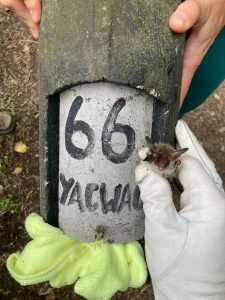Rare bat makes a Strawberry Line appearance
- 1 May 2025
-
 YACWAG admin
YACWAG admin
- Bats, Wildlife
YACWAG has notched up a new record for North Somerset.
Bechstein’s bats are at the northern edge of their range in Britain. They are considered rare but they are also extremely hard to locate and observe.

It is easy to see why YACWAG’s bat group is so excited about the discovery of a Bechstein’s bat in one of their bat boxes on the Strawberry Line. It is the first in-hand record of a Bechstein’s bat in the unitary authority area.
The bat was discovered by three YACWAG members who are professional ecologists and voluntarily monitor YACWAG bat boxes under licence. The bat was also tagged and radio-tracked for a few days under a Vincent Wildlife Trust licence to find out more about its movements.

Bechstein’s bats live in deciduous woodlands and the male was found close to the Strawberry Line at Congresbury, which is not far as the bat flies from Kings Wood, the largest block of woodland in North Somerset. Bats like cavities in trees, but with not enough old trees in the landscape, bat boxes are a good substitute. The habitat around Congresbury includes water, trees and farmland so this male bat was in ideal bat country. The males live alone separately from the females but they also rest up – ‘roost’ – in different places as well. Bechstein’s bats in North Somerset have been captured in nets in the past, and their calls have been heard on bat detectors, but they have never been found in a bat box until now.
YACWAG has a history of ‘firsts’ with bats. In 2014 the group put identification rings on Nathusius pipistrelle bats at Blagdon Lake. This led to the discovery that the species migrates 600 km across the North Sea as the ringed bat was later found in Holland. Last year YACWAG found its first Barbastelle bat. All these species are rare. It is thought that climate change may assist Bechstein and Barbastelle bats to continue to move northwards.
YACWAG’s Chair, Tony Moulin, said, “North Somerset is a hotspot for bats and we are so lucky to have so many significant species around us. It is a privilege to be involved with the conservation of bats and YACWAG will continue our work to monitor populations and raise awareness of their needs.”
For more on YACWAG’s involvement with bats please see our page here
© Copyright YACWAG, or original authors. All rights reserved. | Registered charity 1076362 | Privacy policy | Cookie policy | Terms & Conditions |Web design: StanfordGraphics


